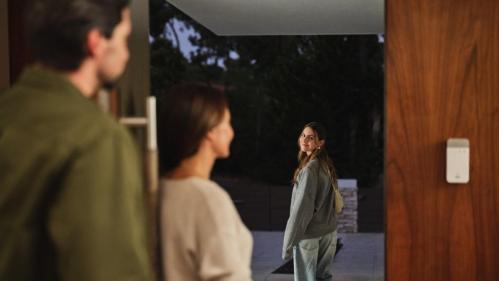
Buy food with care and good sense. Try to buy only organically grown produce. Wash and peel fruit and vegetables to limit possible pesticide exposure; residue may be present even if it not visible.
Any emissions from furnaces, cooking, cleaning products, appliances and pesticides build up in your home. This is why it is so important to ventilate your house properly. Ensure that there is a complete change of air every day. Open windows or use exhaust fans to get rid of stale air. Chemicals that are emitted in the home very often bond to floor, wall and furniture surfaces. These chemicals can have an odour but are noticed less by adults than by children. Also, children, particularly babies, have more contact with affected surfaces and have indirect oral exposure to chemical residue from hand contact. Many of the chemicals build up in human bodies and again babies are affected more by this due to their small body mass and higher levels of exposure. Adequate ventilation helps flush out the chemicals present in the air in your home.
Commercially-produced household cleaners are full of harmful substances. Try to use safer home-made cleaning agents. Avoid using extra-strength cleaning products as these have more solvents, corrosive acids and bases, and they give off more fumes. Chemical residue is very dangerous since young children think nothing of eating off the floor. Their hands and fingers are constantly in contact with the ground and the dirt and residue ends up in their mouths. Along with using milder cleaners, avoid mixing different cleaners together; the resulting chemical reactions can produce very toxic solutions and gases.
When doing renovations of your house and furniture, take care that you do not expose your family to potentially dangerous dust and waste. If your house was built in the 1970's, or is older, there might be lead paint present on some of the finishes. Avoid sanding or removing lead paint yourself, get it done by professionals. Ideally, your house should be vacated during this process. Sanding of compressed or treated wood can give off chemicals, such as formaldehyde. When you choose new finishes for walls and furniture, select the least-toxic products that you are able to. No pregnant woman should be near the scene of renovation work; sanding and grinding dust is potentially harmful. If you do renovation work with your family in the house, seal off the work areas and make sure that you clean up every day. Rubble and waste that is left lying around adds to the fallout in the air.
Pesticides are potentially very harmful to your family, especially to your young children. Do not use them in the house and avoid using them on the grass outside. Chemical residue can be brought into your house via foot traffic, deposited onto the floor and find its way onto your children's skin. Pollution can be blown in from miles away, and fallout can land on the street and pavements around your house. All these contaminants get into your house in small amounts. Long-term exposure to tiny amounts of chemical waste is dangerous since heavy metals and poisons tend to get stored in human and animal bodies.






